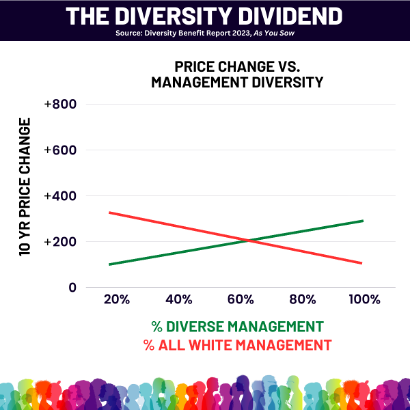Workplace diversity, equity, and inclusion
Workplace Equity INITIATIVE
The Workplace Equity Initiative is based on the need for material disclosure from companies on the effectiveness of their workplace equity programs. When we began this program in 2019, corporate disclosures of workplace diversity, equity, and inclusion (DEI) programs were primarily anecdotal and qualitative. Corporate reporting provided selective data that was challenging to use and focused only on casting the company in the best possible light – equivalent to offering revenues without expenses.
Investors, however, require consistent and full data sets. Without data, external stakeholders are unable to know how effective popular diversity and inclusion programs are, if at all. Without corporate disclosure of key diversity and inclusion metrics, investors are unable to identify which companies are “walking the talk” and which companies are primarily using diversity as a marketing tool.
+ Investors call for Transparency in Workplace Equity Data
This Investor Statement is currently supported by 125 signatories representing $1.88 Trillion in AUM.
Sign the Workplace Equity Disclosure Statement
+ Corporate Engagement on Workplace Equity and Diversity Data
As You Sow’s workplace equity shareholder engagements are informed by the data within the Workplace Equity Disclosure Scorecard. When we speak with companies, they are asked to release hiring, promotion, and retention rates for diverse employees, as well as two, or more, years of EEO-1 forms.
To allow companies to effectively gather this data and present it in an accurate and meaningful way, we acknowledge the need for some time to publicly release these metrics. The release of the data is important from a transparency perspective; from a communications perspective we also recommend that companies place it within a tailored narrative context specific to their organization. Tracking the data, reconciling the numbers, and crafting communications can take some time.
With this in mind, in our shareholder resolution withdrawal conversations with companies, we generally ask that they release their hiring, retention and promotion rates (gender globally, race and ethnicity within the United States) within the next two years. The workplace equity data visualization tool tracks both released data and data that companies have committed to release.
+ Workplace Equity Scorecards: Quarterly Update Key Findings as of December 31st, 2024
View our Workplace Equity Scorecard Data Visualization Tool
- Nearly 90% of the S&P 100 companies release, or have committed to release, their consolidated EEO-1 forms, a good first step for sharing workplace composition. In August 2020, when this benchmarking project began, only 20% of the S&P 100 did so.
- 18% of Large-Cap 3000 companies release or have committed to release their EEO-1 report, whereas almost half (45%) of Russell 1000 companies do.
- Nearly two-thirds (64%) of the Large-Cap 3000 companies release gender/racial demographic data on their workforce in some form, whereas 89% of Russell 1000 companies do.
- Within the Large-Cap 3000 constituent companies, the Financials sector has the most companies releasing their EEO-1 forms.
- Within the Large-Cap 3000 constituent companies, the Financial Services sector has the most companies releasing promotion rate data and hiring rate data by gender. The Industrials sector has the most companies releasing retention rate data by gender.
- Within the Large-Cap 3000 constituent companies, the Consumer Staples sector has the most companies releasing promotion rate data by race.
- Within the Large-Cap 3000 constituent companies, the Healthcare and Information Technology sectors have the most companies releasing hiring rate data by race.
- Within the Large-Cap 3000 constituent companies, the Financial Services sector has the most companies releasing retention rate data by race.
- Of the inclusion factors, hiring rates are the most reported on, while promotion rates are the least.
- Companies were most likely to release hiring rates of their Black and female employees. They were least likely to share data related to their Native American and Pacific Islander employees.
- Disclosure rates of recruitment, retention, and promotion data by race and ethnicity is still catching up to gender data, likely a reflection of the #metoo movement gaining traction in 2017, while the protests in the aftermath of George Floyd’s murder began in late May, 2020, far more recently.
- Companies that have made future, time-bound commitments to release at least two of the three inclusion factors are: Albertsons, Bank of America, Bank of New York Mellon, Baxter International, Biogen, Charter Communications, The Walt Disney Co., eBay, Electronic Arts, Estee Lauder, Ford Motor, General Dynamics, NCR Voyix, Philip Morris International, Raytheon Technologies, Simon Property Group, Southern Co, Sprouts Farmers Market, T-Mobile, Target, Texas Instruments, Thermo Fisher Scientific, and Victoria's Secret, among others.













